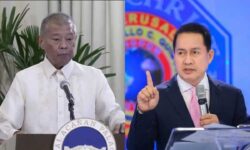
DOJ’s move vs judge raises judicial independence concerns
SEVERAL legal experts have raised concerns about the Department of Justice (DOJ) interfering in Davao’s judicial process regarding the Temporary Protection Order (TPO) that halted the Philippine National Police (PNP) from activities threatening the human rights and security of Kingdom of Jesus Christ (KOJC) members. They argue that this interference could have a “chilling effect” on judicial independence.
The controversy began when DOJ Secretary Jesus Crispin C. Remulla announced earlier this week that the department intends to file a case against Davao City Regional Trial Court (RTC) Branch 15 Judge Mario Duaves, who issued the TPO on August 27, 2024, in favor of KOJC members.
On September 2, Lawyer Harry Roque criticized the DOJ, asserting their actions undermine the Constitution’s judicial review powers.
He stated, “Pinapatunayan ng aksyon ni Sec. Jesus Crispin Remulla na ang ating bansa ay patungo sa diktadura. Tatlong bagay ang malinaw: Una, pangingialam ito ng ehekutibo sa hudikatura. Pangalawa, pinatatahimik ang magkaibang opinyon. Pangatlo, isa itong simpleng pananakot sa mga kumokontra sa Palasyo (Sec. Jesus Crispin Remulla’s actions suggest our country is heading towards dictatorship. Three things are clear: First, there is executive interference in the judiciary. Second, differing opinions are being silenced. Third, it’s a threat to those opposing the Palace).”
Veteran lawyer Ceasar Europa also expressed concerns about the DOJ’s decision. He said, “The announcement from Justice Secretary Remulla of the intention to file charges against Judge Mario Duaves for issuing a TPO is troubling, to say the least.”
Europa added that transferring criminal prosecutions against Quiboloy and others does not remove the courts’ competence to hear other cases, such as the one prompting the TPO.
“What is most troublesome to me is the fact that the DOJ announcement necessarily has a chilling effect on our Judiciary. It sends the wrong message to our courts not to do anything that is against the acts of the Executive branch of government,” Europa noted.
Following the TPO, which directed the PNP to remove barricades and roadblocks affecting KOJC members’ rights, Judge Duaves also issued a Supplemental and Clarificatory Order on August 28. This order clarified that the TPO did not cancel or nullify any warrant of arrest processes, stating that both serve different purposes and are not contradictory.
The court order instructed that the TPO be directed to “any senior commanding PNP-11 officers present within the premises of KOJC and Jose Maria College Foundation Inc. (JMCFI) and at their regional office.”
In an interview, former Integrated Bar of the Philippines (IBP) President Domingo Cayusa said there is no set timeline for executing a warrant of arrest as long as there is reasonable belief that the suspect is present. This means that the police can attempt to serve the warrant at any time until it is successfully executed, provided they have reasonable suspicion that the suspect is at the location being searched.
“There is no limit to the implementation of warrant of arrest lalong-lalo na in a situation like this kung saan there are indicators that the suspect or the subject of a warrant of arrest ay nandoon nagtatago (There is no limit to executing a warrant of arrest, especially in a situation like this where there are signs that the suspect is hiding there),” he clarified.
DOJ vs Duaves
On August 31, Remulla explained that the DOJ had petitioned the Supreme Court to transfer the Davao City case against Quiboloy and his co-accused to the RTC in Metro Manila. The Supreme Court granted this petition, which Remulla argued rendered the Davao City RTC’s jurisdiction over the case moot and problematic.
SunStar Davao visited RTC Branch 15 on September 2 to interview Judge Duaves, but his staff indicated that he would not entertain questions related to the case. DEF



